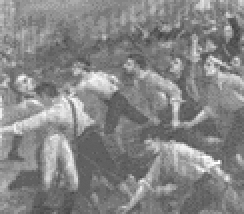Battle of Oulart Hill facts for kids
Quick facts for kids Battle of Oulart Hill |
|||||||
|---|---|---|---|---|---|---|---|
| Part of the United Irishmen Rebellion | |||||||
 United Irishmen charge at Oulart Hill. |
|||||||
|
|||||||
| Belligerents | |||||||
| Commanders and leaders | |||||||
| Fr. John Murphy | Colonel Foote | ||||||
| Strength | |||||||
| 4,000 – 5,000 | 110 | ||||||
| Casualties and losses | |||||||
| Unknown number killed | 105 killed | ||||||
The Battle of Oulart Hill happened on May 27, 1798. It was a big fight during the Irish Rebellion of 1798. In this battle, a large group of Irish rebels, about 4,000 to 5,000 strong, completely defeated a smaller group of 110 soldiers. These soldiers were sent from Wexford town to stop the growing rebellion in County Wexford.
Why the Battle Started
Rising Tensions in Wexford
Before the battle, there was a lot of worry in County Wexford. News arrived that the United Irishmen had started a rebellion on May 23. The government had also begun a harsh campaign to disarm people in the county. This meant they were trying to find and take away weapons from anyone suspected of being a rebel.
Harsh Methods Used
To find rebels, soldiers used very tough methods. These included cruel punishments and burning houses. A group of soldiers called the North Cork Militia had just arrived in Wexford. They were known for being very brutal. Local soldiers also caused fear.
Fear and Gathering Together
News of terrible events in other towns, like Dunlavin Green and Carnew, made people even more scared. Because of this fear, many people started gathering in large groups, especially at night, to feel safer.
First Skirmish at The Harrow
On the evening of May 26, about 100 people gathered near a place called The Harrow. They were led by Father John Murphy. They met a group of about 20 soldiers who were on their way to burn a suspected rebel's house.
The soldiers burned the house. On their way back, they met Father Murphy's group again. A small fight broke out. The soldiers lost two men, and the rest ran away to report what happened.
Events of May 26 and 27
Quick Reactions from Both Sides
After the skirmish, both sides reacted quickly. The soldiers, angry about their losses, went around burning and killing people without checking if they were rebels. At the same time, the rebels gathered more people from the countryside. They also raided houses and large estates to get weapons. During these raids, more loyalists and soldiers were killed.
Soldiers Sent from Wexford
News of these fights and raids reached Wexford town. On the morning of May 27, most of the soldiers stationed there were ordered to move. About 110 North Cork Militia soldiers, led by Colonel Foote, were sent north to stop the rebellion.
Doubtful Loyalty of Some Troops
On their way, they were joined by about 16 cavalry soldiers led by Colonel Le Hunt. However, many of these cavalry soldiers were not truly loyal to the government. Some, including their sergeant, had actually joined the rebels that very morning.
The Battle of Oulart Hill
Militia Reaches Oulart
The soldiers reached the village of Oulart at 2 p.m. on May 27. They saw a huge group of rebels, between 4,000 and 5,000 strong, on top of Oulart Hill. The soldiers bravely, but perhaps too quickly, moved forward and chased the rebels up the hill.
Rebels Turn and Fight
The rebel leaders mistakenly thought that a large group of cavalry soldiers was waiting to stop them if they tried to run away. So, feeling trapped, the rebels turned around to face the soldiers. They attacked with great force and "killed the whole detachment in an instant."
Outcome of the Battle
Only Colonel Foote, the commanding officer, and four other soldiers managed to escape back to Wexford. Colonel Foote later reported that his soldiers had advanced too carelessly. He said they were surrounded and overwhelmed by the huge number of rebels, most of whom were armed with pikes. He also mentioned that many rebels were killed in the fight.
After this important rebel victory, almost all of North Wexford joined the rebellion. Government forces and loyalist civilians gave up control of the countryside. They moved to towns like Enniscorthy, Gorey, and Wexford for safety.
 | DeHart Hubbard |
 | Wilma Rudolph |
 | Jesse Owens |
 | Jackie Joyner-Kersee |
 | Major Taylor |

